The End of My Pandemic Affair
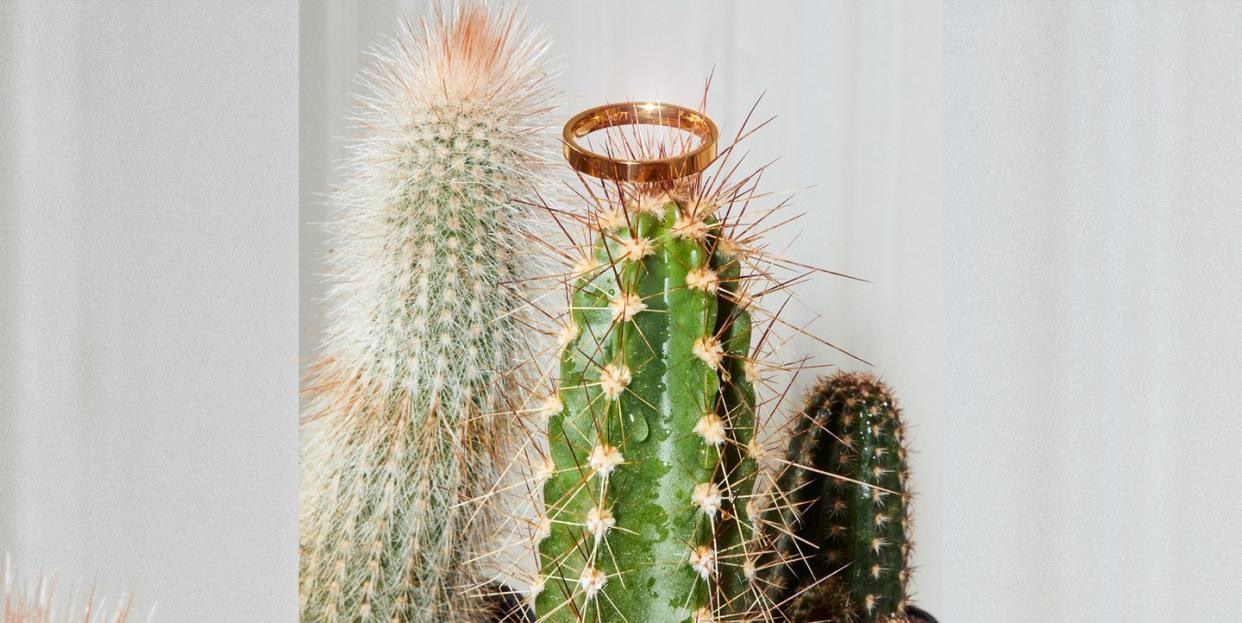
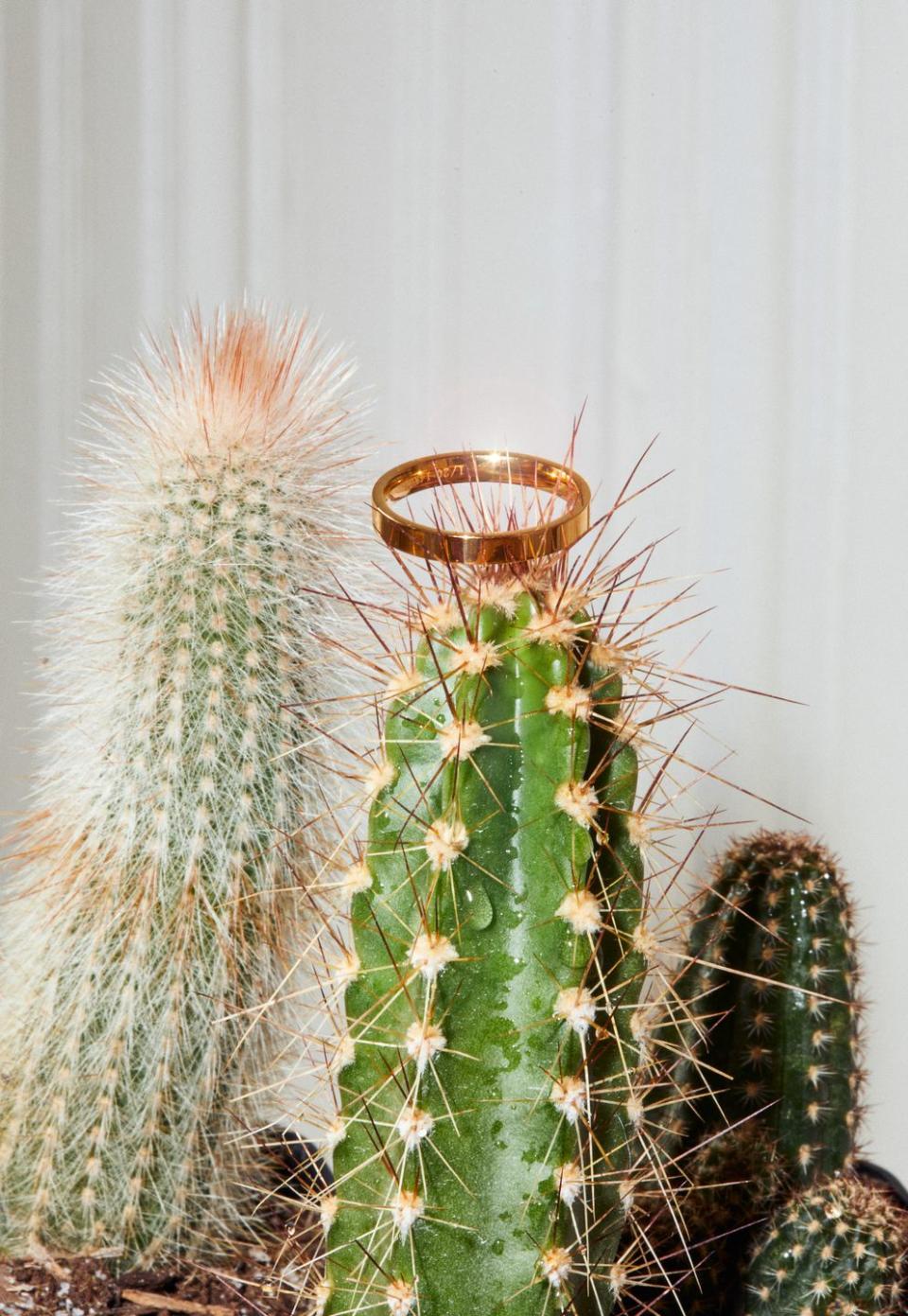
“I know what everyone is thinking,” a man said to me on the phone late one night, almost six months into the pandemic. He was telling me that the woman he had met a month earlier was—she was!—the one. He was maybe going to marry her. “I know it sounds crazy,” he continued. “I know people are just going to say it’s the pandemic. But it’s really not.” He sounded a little breathless, like he had run too fast and still couldn’t rest.
I believed him. I tried to reassure him. I mostly wanted him to exhale. His love sounded sincere, I said, and I trusted that he knew his life better than anybody else did. But—I started gently—let’s say, just for the sake of argument: what if there was something to that question of why this love was happening now? What if living through an unprecedented moment of total disaster had fundamentally altered him forever and then, in turn, the way he thought about how his relationships took shape in his life? Would saying that the pandemic had changed him, and changed his commitment to an intense love affair, somehow cheapen that feeling?
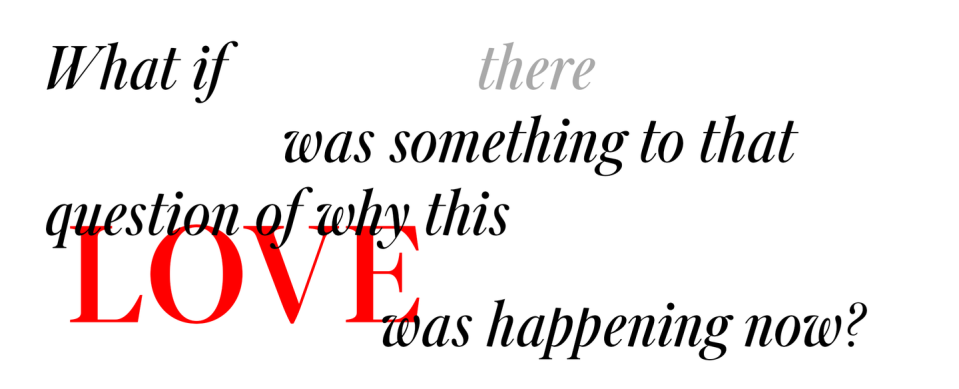
In the early months of the pandemic, I had lots of conversations along these lines, all variations on seeing the crisis in front of us. We talked about parents in long-term-care facilities, neighbours we spoke to who had been abandoned by the city in their homes, friends expecting their first babies or approaching their last chemotherapy treatments, and eventually yet suddenly, the people we knew who were testing positive for Covid-19. Our fears were different, but the feelings were always a version of the same question: Who would take care of us?
This is the kind of thought that, once spoken aloud, echoes a bit too loudly. Perhaps that’s why it often led to a slightly softer question, a common reflex hard to shake even in extraordinary times: what would this moment do to our relationships? Experts were consulted; numbers were passed around on Twitter. Would more people, after considering the prospect of an endless lockdown, decide to divorce? Would the four walls of a shared apartment become too small for those previously committed in love and on a lease?
Friends consulted me for a reason obvious to them: I have been divorced for four years, and for the past three I have been working on a book that is a personal, cultural, and social history of divorce. My writing is informed by what is, in every sense, my family’s business. My mother is a divorce mediator, and her office was our family basement for most of my childhood. My first job was answering her phones.
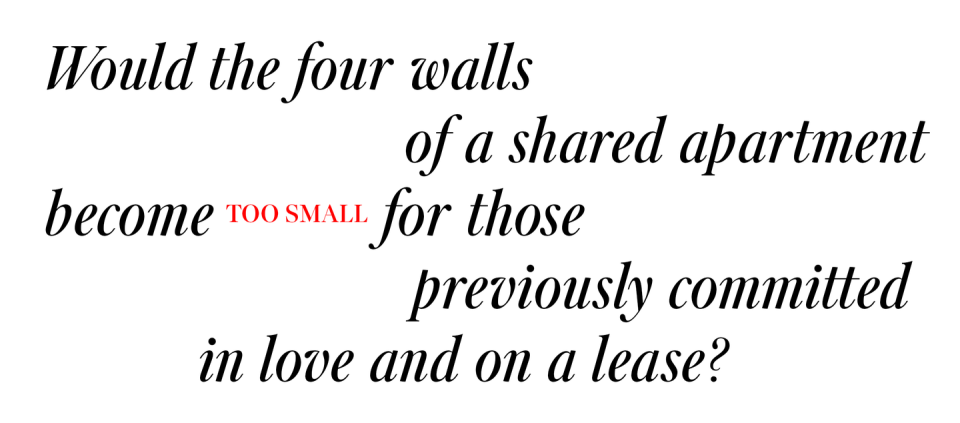
I wasn’t surprised to hear stories about people concerned that their marriages and long-term relationships might be tested, but I also wasn’t surprised when many of these fears proved, at least anecdotally, not entirely correct. In previous eras of social and political upheaval, divorce rates have often spiked, but those are perhaps better understood as administrative decisions than as emotional ones—many of the marriages had been over for a long time already, and they are most significant as a way to see what will inspire or force people to make a move.
But what do I know? I am just one divorcée, trying my best. When I think back to those weeks of urgent, unanswerable questions—weeks that now all seem to lead to that man calling to say he had found an answer—I am remembering when spring was turning to summer and most of my time was spent moving between one respite from the heat to another. Late at night I would shower, place a frozen grape under my tongue, and dial his number. A promise neither of us had yet made hung in the balance between each ring. “How’s home?” I asked one of those nights, testing his reaction to my use of that phrase. “Home’s here, and waiting for you,” he replied. How lovely I felt in that moment eludes description. I want to compare it to pure, open air in my lungs, or the chillest glass of water. In that sweaty season, those were the elements that felt most precious, and so too was the brief moment when I believed I was someone who had a person and a place waiting for her.
We had been introduced more than a decade ago. He was a few years older, and we were both young enough then that the difference mattered. He had a beautiful apartment with walls of books. The first time I went over, it was with friends not ready to admit the night was ending, smoking his cigarettes and drinking his whiskey until it was practically dawn; I borrowed one of his sweaters. “Someone told me that when we first met, you had a crush on me,” he said to me on the only night we spent together. “That’s ridiculous,” I said. There’s no way it was just one person.
Still, as I got closer to the age he was when we met, I began to see things differently. As I developed my own tastes, his started to look a little corny. He could be closed to conversation, preferring a monologue or, worse, an airless debate. He had a bad habit of interrupting women who had much more interesting things to say.
A fall night came when we were the last left at a party, and whatever was happening between us would have to happen now or never. I was uncertain, unsteady. I had gotten drunk early, high late, and now was barely in a position to stand on my own two feet, let alone on principle. “This is a one-time thing,” I said. “I don’t think so,” he said.
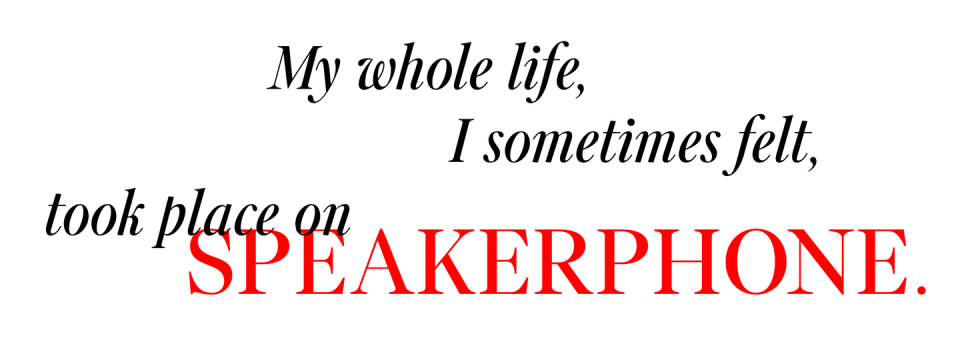
It turned out I was right, though neither of us could have guessed how or why. I flew back to where I lived. We didn’t speak again until March, in the week when the pandemic hit New York hard and fast. He called to see how I was doing, to ask what I was seeing—the first of our friends to do so. It was a kind gesture. Maybe that’s why we didn’t talk about our one-time thing at all, the better to preserve the good intention. Still, I assumed the phone call would be another singular event.
But three Fridays later we spoke again while I cooked dinner and he talked about his work. There was a brief text exchange when I got some good gossip I knew he’d want to know. One weekend we watched a movie in tandem. My whole life, I sometimes felt, took place on speakerphone. I walked barefoot across wood floors, pacing through conversations about our past in the attempt to believe we might have a future.
I was hesitant—about logistics, mainly. If I could have snapped my fingers and been in his apartment, I would have. But the other factors on top of a pandemic—the distance, the friends we shared, the fact that we had never even gone on a real date—concealed other reasons to pause. He could admit he had feelings for me but, if tested, would never really commit to them. I couldn’t admit to my feelings for him but would have, if circumstances allowed, committed in a heartbeat. “Tell me about our life together,” he would say on those first few calls, and I often couldn’t—couldn’t speak to that fantasy because I couldn’t trust myself in it. “I just want someone who will ask how my day was,” I would say.
I didn’t know how to describe what was happening between me and this man on the phone, so for the most part I kept it to myself, only talking about it with friends who I knew had a high tolerance for elliptical thoughts. The beginnings and endings of a relationship are often where stories start and stop, and sometimes we are too easily taken by the simplest parts, too romantic about moments of extreme highs and lows. If we don’t know how to explain what happened, or say clearly what was lost, we are left holding what sounds like the heat of a fever dream. At least in marriage or divorce, paperwork can provide the tactile element that ties a feeling to reality.
Then one week passed without us talking, and then it was four. On the fifth week, I changed his name in my phone to “do not text or call.” A day later we spoke, and it was so that he could tell me he knew what everyone was thinking. He was now the friend who would marry another woman for reasons that made sense and couldn’t be explained. He was sorry though still somehow unrepentant. I had to understand, he told me. It just happened. I did understand, I promised. No one could understand better than I did.
We hung up the phone. I was stunned: Not being surprised is not the same as not being shocked. I knew this had been neither a relationship nor the end of one, yet the conversation left me sleepless. How could I explain what happened between us? All I could think was that we had spent the past ten years practicing how to leave each other before ever considering whether we could stay.
I have often observed that people—myself included—are quick to know which stories do not suit them. They are slower to give up the stories that still serve them. And why would they? Who falls in love with the idea of a series of small, unfolding, unpredictable changes, with the slow process of losing, easily and almost without notice, the corners of what you believed to be the shape of your life? Instead we want the language of eternity, the assurance of soon always. In those moments, when you speak with solid certainty, you can feel your life come to a point. You can consider yourself understood, cleanly and without complication. Who wants to say that marriage and divorce can reveal that the way we love is often as much about circumstance as it is about choice? Not me.
Sometimes I recall this time with a feeling like stepping into the street without realizing it’s not my light and snapping back to the curb: I came so close to living a life that wasn’t mine. Other times it’s not so simple. I am still waiting to see how this will change the direction of how I feel, how I line up what I want beside what is possible to have. One day, this may become part of a story I tell someone whom I need to make understand something about myself that even I don’t. “I know what everyone was thinking” is how I’ll start, to help us both make sense of how things end.
Haley Mlotek is a writer, editor, and organiser who is writing a book about divorce.
You Might Also Like

 Yahoo Movies
Yahoo Movies 
